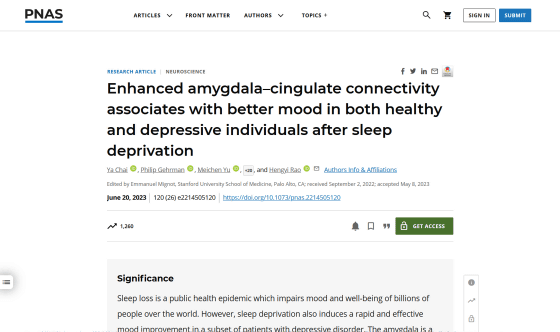Brain scan reveals the reason for the mysterious phenomenon that ``staying up all night relieves symptoms of depression''

Many people believe that staying up all night or not getting enough sleep not only reduces cognitive function but also has a negative impact on health, and that it is all harm and no good. However, surprisingly, a treatment called ``
Enhanced amygdala–cingulate connectivity associates with better mood in both healthy and depressive individuals after sleep deprivation | PNAS
https://doi.org/10.1073/pnas.2214505120

Staying Up All Night May Actually Relieve Depression in Some People : ScienceAlert
https://www.sciencealert.com/staying-up-all-night-may-actually-relieve-depression-in-some-people
Staying up all night and sleep deprivation is a problem that threatens the health of people around the world, but staying up all night may have a temporary antidepressant effect for some people with depression. While treatment with general antidepressants takes more than two weeks to become effective, sleep deprivation therapy is unique in that antidepressant effects can be seen immediately after staying up all night. It is said that it may be used for patients who do not respond well to the treatment.
Therefore, in a study led by the University of Pennsylvania in the United States, 30 subjects suffering from depression and 38 subjects with no history of mental illness stayed up all night and conducted a questionnaire survey, including 16 subjects with no history of mental illness who did not stay up all night. I had a brain scan. The subjects who stayed up all night passed the time until morning by reading, playing computer games, watching TV, etc., and did not consume caffeine or exercise.

As a result of the experiment, many people without depression became moody due to lack of sleep, but it was found that 13 out of 30 patients with depression improved their mood after staying up all night. It has been confirmed that for some patients with depression, staying up all night does indeed improve their symptoms.
When examining the subjects' brains using

Nowadays, it is known that the body's
Research on such chronotherapy suggests that a strong impact on circadian rhythms may reset the regulatory processes in the body that have gone awry. The reason why the connectivity between the amygdala and anterior cingulate cortex was restored after staying up all night may be due to the reset of the circadian rhythm.
Of course, we know that a lack of sleep can increase the risk of dementia and other health problems later in life, and it can also have a negative impact on social life, so staying up all night is good for people with depression. I can't say. However, mapping the connectivity between brain regions restored by staying up all night may lead to elucidation of the mechanisms that may cause depression.
'At the very least, if we find that it is possible to strengthen connections between brain regions important for mood, we could improve the mood of large numbers of people without depriving our brains of the benefits of restful sleep,' says Science Alert. Maybe we can find a way to improve it.”

Related Posts:
in Science, Posted by log1h_ik







